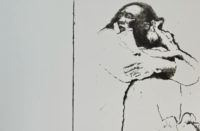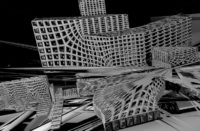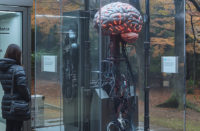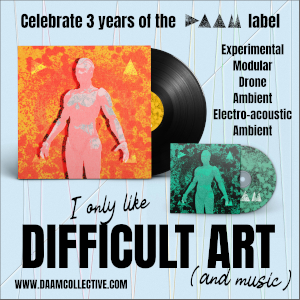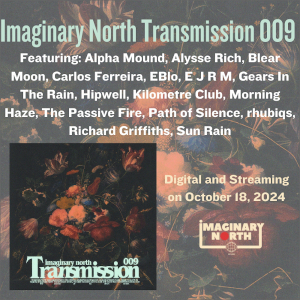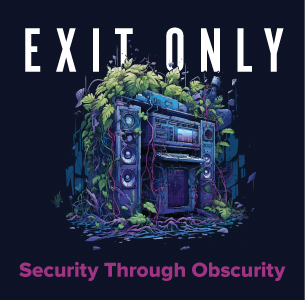
::..:::…..:..::….:::::..:::..:::::::……:::…::.:::….::::..:..:::…::…….::::
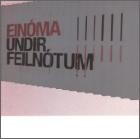 :: Einóma, a new Icelandic project of producers Steindór & Bjarni, are on to something. Their mix of floating notes and experimental electronics makes for a percussive treat on “Glerborgir.” This disc is chock-full of atmosphere in the uppermost sense as witnessed on “Hringlögun,” a sparse and downbeat track. The compelling “Amonie” pulses with hip-sway fueled inner fire and a faint unsettling curve. “En Route” teases with picking up the pace but settles in the shallows of a satisfying filtered drone. This seems like the type of record that would appeal to those who are desperately trying to ween themselves off drum + bass. With its apt decision to keep more grounded than frenetic – Undir Feilnótum has its fair share of groove on the poppy “Celvoir” which sizzles and shakes, then comes down to survey earth. Like a sequenced electrical storm this disc is a mutated breather from a number of like attempts on contemporary electronic pop music. Part science-fiction and part sensory, Einóma has outdone itself on its debut full-length, is that possible?
:: Einóma, a new Icelandic project of producers Steindór & Bjarni, are on to something. Their mix of floating notes and experimental electronics makes for a percussive treat on “Glerborgir.” This disc is chock-full of atmosphere in the uppermost sense as witnessed on “Hringlögun,” a sparse and downbeat track. The compelling “Amonie” pulses with hip-sway fueled inner fire and a faint unsettling curve. “En Route” teases with picking up the pace but settles in the shallows of a satisfying filtered drone. This seems like the type of record that would appeal to those who are desperately trying to ween themselves off drum + bass. With its apt decision to keep more grounded than frenetic – Undir Feilnótum has its fair share of groove on the poppy “Celvoir” which sizzles and shakes, then comes down to survey earth. Like a sequenced electrical storm this disc is a mutated breather from a number of like attempts on contemporary electronic pop music. Part science-fiction and part sensory, Einóma has outdone itself on its debut full-length, is that possible?
::..:::…..:..::….:::::..:::..:::::::……:::…::.:::….::::..:..:::…::…….::::
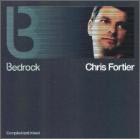 :: Along with colleagues John Digweed, Dave Seaman and others, Floridian Chris Fortier has been on the progressive turntable scene for a dozen years. He DJs throughout the Americas, Europe and Asia and has mixed among others: BT, Delerium and Angel Moraes. His focus on the double disc Compiled and Mixed is percussion, in many forms of organic beat. Drawing primarily from electronica and world rhythm, Fortier has melded atypical dance tracks with a fashioned sensibility of both IDM and booty call. The first track to sonically charge my sound system was “Future (Mix One)” by Hamel, Swain & Snell (Sunkissed). This romping-stomping groove track is heavily beat-laden and is perfectly matched with Baltimore’s Ben Camp on “Timewreck” and “Timecrash (Mira Remix)” which follow. The beat and repetition of elements is uncontainable here. With releases on Fade, StreetBeat and Limbo Records, Fortier rightly places himself in a fine line of like spinsters gaining momentum with each new project. His masterful technique has been heard at Bedrock, Colours and Renaissance, now in residence at Prologue @ The Cross.
:: Along with colleagues John Digweed, Dave Seaman and others, Floridian Chris Fortier has been on the progressive turntable scene for a dozen years. He DJs throughout the Americas, Europe and Asia and has mixed among others: BT, Delerium and Angel Moraes. His focus on the double disc Compiled and Mixed is percussion, in many forms of organic beat. Drawing primarily from electronica and world rhythm, Fortier has melded atypical dance tracks with a fashioned sensibility of both IDM and booty call. The first track to sonically charge my sound system was “Future (Mix One)” by Hamel, Swain & Snell (Sunkissed). This romping-stomping groove track is heavily beat-laden and is perfectly matched with Baltimore’s Ben Camp on “Timewreck” and “Timecrash (Mira Remix)” which follow. The beat and repetition of elements is uncontainable here. With releases on Fade, StreetBeat and Limbo Records, Fortier rightly places himself in a fine line of like spinsters gaining momentum with each new project. His masterful technique has been heard at Bedrock, Colours and Renaissance, now in residence at Prologue @ The Cross.
Disc two of this set warms up with Kolo’s “Nova” with its amplified voice recognition and snapshot sounding combine technique. It’s like taking an Alva Noto (Raster-Noton) track adding some speed, laser light and waiting until its golden brown! Throw in a lil’ rasta on Graham & Porter’s “Two Days On Lansdowne” here you have a masterful all-night rave party closing with his self-penned and trance-based “Losing Wait (Instrumental)” that shows off his prowess and pride for making the night endless. As the former king of bootleg mix tapes, Fortier has come a long way up the shores of sunny Florida breathing life into an international Technicolor nightlife.
::..:::…..:..::….:::::..:::..:::::::……:::…::.:::….::::..:..:::…::…….::::
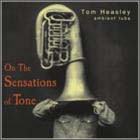 :: Tom Heasley’s ambient tuba work is just plain lush. Besides tuba, composer/performer Heasley also experiments with digital processing and throat singing on this release. This work is improvised in the studio, without edits, which makes for an incredible attention-to-detail listen. Of the two pieces here “Prelude,” which was recorded and mixed by the ubiquitous Robert Rich, loses no subtleties in its open-air, beatless structure. Its sense of space is unusual as it is of the essence of San Francisco fog sensitively rolling in over the hills. At 42 minutes “Thonts” is the centerpiece here. Chilling and atmospheric – who knew the tuba could do that? – this is an evocative piece of music to be reckoned with. Recorded in Philadelphia this reminds me of sounds you might hear in the wilderness of the lost lava pits of Iceland. Before venturing solo, Bay Area-based Heasley played with a range of musicians from polar genres including Charlie Haden’s Liberation Music Orchestra, Pauline Oliveros, Thomas Buckner, Eugene Chadbourne, Fred Frith, Loren Mazzacane Connors and ex-Mother of Invention Don Preston. This versatility has served his sensibilities well. He has played in museums and in barns, in grand opera halls and in living rooms. On The Sensations of Tone is truly a one-of-a-kind, sensory-driven composition. Heasley’s follow-up to Where The Earth Meets The Sky (Hypnos) is full with a stark depth that could be called mind yoga. This is by far, the ambient release of the year (and it’s only June!).
:: Tom Heasley’s ambient tuba work is just plain lush. Besides tuba, composer/performer Heasley also experiments with digital processing and throat singing on this release. This work is improvised in the studio, without edits, which makes for an incredible attention-to-detail listen. Of the two pieces here “Prelude,” which was recorded and mixed by the ubiquitous Robert Rich, loses no subtleties in its open-air, beatless structure. Its sense of space is unusual as it is of the essence of San Francisco fog sensitively rolling in over the hills. At 42 minutes “Thonts” is the centerpiece here. Chilling and atmospheric – who knew the tuba could do that? – this is an evocative piece of music to be reckoned with. Recorded in Philadelphia this reminds me of sounds you might hear in the wilderness of the lost lava pits of Iceland. Before venturing solo, Bay Area-based Heasley played with a range of musicians from polar genres including Charlie Haden’s Liberation Music Orchestra, Pauline Oliveros, Thomas Buckner, Eugene Chadbourne, Fred Frith, Loren Mazzacane Connors and ex-Mother of Invention Don Preston. This versatility has served his sensibilities well. He has played in museums and in barns, in grand opera halls and in living rooms. On The Sensations of Tone is truly a one-of-a-kind, sensory-driven composition. Heasley’s follow-up to Where The Earth Meets The Sky (Hypnos) is full with a stark depth that could be called mind yoga. This is by far, the ambient release of the year (and it’s only June!).
::..:::…..:..::….:::::..:::..:::::::……:::…::.:::….::::..:..:::…::…….::::
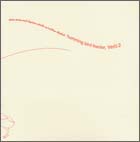 :: Spain’s little label that could, Lucky Kitchen, is cooking some late night tasty treats and serving them on a silver platter (er, disc) where leftovers may only be miniscule pieces. Humming Bird Feeder Ver0.2 is the sixth release in their Sparking Composers Series and it shines and gleans and glistens with masterful re-mixing duties by all three collaborators. This is a solid digital recording partly documenting Stephen Vitiello’s recent installation piece at New York’s Diapson Gallery with remixes by mainstay computer soundist Tetsu Inoue (12K, Tzadik, Fax, Rather Interesting) and video/sound artist and Alfred University teacher Andrew Deutsch. Vitiello also has had his work presented as part of the Whitney Biennial, now a major force in associating visual and sound art. This release follows last year’s quite sprightly Field Tracker (Anomalous) collaboration between Inoue and Deutsch. The disc blends contact mic sounds from birds feeding – providing an organic-based, yet digital sounding beat. The five untitled tracks are marked with symbols: *, @, ^, %, ~ distancing them from traditional tracking as the recording has a continuous flow. Microsound elements mixed with the buzzing outdoors make this a comforting take on electronica. We hear a feeder dripping and the amplified sting of the hummingbird engaging in a moment like a tiny drill. At times like a dental tool, also like a mosquito – the sounds here capture subtleties often not seen with human eyes. Track five (~) brings us closest to the actual scene as we enter a garden-like bird sanctuary, recalling memories of mom pulling in the laundry on a squeaky line among other images. Mechanical percussion sounds drag while crows caw and chirp awkwardly. Closing with a remix of very live samples and drone this is high-form ambient music for one of those hot summer nights where you need to just chill.
:: Spain’s little label that could, Lucky Kitchen, is cooking some late night tasty treats and serving them on a silver platter (er, disc) where leftovers may only be miniscule pieces. Humming Bird Feeder Ver0.2 is the sixth release in their Sparking Composers Series and it shines and gleans and glistens with masterful re-mixing duties by all three collaborators. This is a solid digital recording partly documenting Stephen Vitiello’s recent installation piece at New York’s Diapson Gallery with remixes by mainstay computer soundist Tetsu Inoue (12K, Tzadik, Fax, Rather Interesting) and video/sound artist and Alfred University teacher Andrew Deutsch. Vitiello also has had his work presented as part of the Whitney Biennial, now a major force in associating visual and sound art. This release follows last year’s quite sprightly Field Tracker (Anomalous) collaboration between Inoue and Deutsch. The disc blends contact mic sounds from birds feeding – providing an organic-based, yet digital sounding beat. The five untitled tracks are marked with symbols: *, @, ^, %, ~ distancing them from traditional tracking as the recording has a continuous flow. Microsound elements mixed with the buzzing outdoors make this a comforting take on electronica. We hear a feeder dripping and the amplified sting of the hummingbird engaging in a moment like a tiny drill. At times like a dental tool, also like a mosquito – the sounds here capture subtleties often not seen with human eyes. Track five (~) brings us closest to the actual scene as we enter a garden-like bird sanctuary, recalling memories of mom pulling in the laundry on a squeaky line among other images. Mechanical percussion sounds drag while crows caw and chirp awkwardly. Closing with a remix of very live samples and drone this is high-form ambient music for one of those hot summer nights where you need to just chill.
::..:::…..:..::….:::::..:::..:::::::……:::…::.:::….::::..:..:::…::…….::::
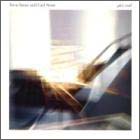 :: OK, I may be a lil’ slow on the upswing when it came to this disc – but what a slow burn it offers! Cycling ’74 (C74), out of San Francisco has only been releasing since 2000 and so far offer six incredible discs by artists ranging from Kim Cascone to the Freight Elevator Quartet, each utilizing C74 software. C74 are both a label and software company and have a generous subscription program – so check them out! Back to the music –and what a venerable, initial collaboration it is. Bay Area-based electronic composer Carl Stone (EM:T; Toshiba, New Albion) has been recording since the 70s and has received numerous grants and critical accolades from the press to the NEA. He has presented work at the Los Angeles Museum of Contemporary Art and the Olympic Arts Festival among others. Since 1992 Tetsu Inoue has collaborated with electronic masterminds Atom Heart, Pete Namlook and Taylor Deupree and has amassed a significant body of sound art. pict.soul is a unique collective process where the Max/MSP, Csound, Supercollider and ProTools programs are all put to generous use. What results is a tonal universe of unique and unscripted sounds. There is a calm force to the overall concept here, less static and glitch, more tones and smoother sine waves. Sound sources remain anonymous, but in exchange we are offered fresh, post ambient treatments of each artists’ style. “(.ram” is a visually repetitive gem, like a casino-cam focusing on the roulette wheel, concentrating on the ball bearing. The muted “^.error” is a seemingly sun-warped, old jazz record played at less than 33bpm. Inside the CD’s digipak are a few accompanying haiku’s like:
:: OK, I may be a lil’ slow on the upswing when it came to this disc – but what a slow burn it offers! Cycling ’74 (C74), out of San Francisco has only been releasing since 2000 and so far offer six incredible discs by artists ranging from Kim Cascone to the Freight Elevator Quartet, each utilizing C74 software. C74 are both a label and software company and have a generous subscription program – so check them out! Back to the music –and what a venerable, initial collaboration it is. Bay Area-based electronic composer Carl Stone (EM:T; Toshiba, New Albion) has been recording since the 70s and has received numerous grants and critical accolades from the press to the NEA. He has presented work at the Los Angeles Museum of Contemporary Art and the Olympic Arts Festival among others. Since 1992 Tetsu Inoue has collaborated with electronic masterminds Atom Heart, Pete Namlook and Taylor Deupree and has amassed a significant body of sound art. pict.soul is a unique collective process where the Max/MSP, Csound, Supercollider and ProTools programs are all put to generous use. What results is a tonal universe of unique and unscripted sounds. There is a calm force to the overall concept here, less static and glitch, more tones and smoother sine waves. Sound sources remain anonymous, but in exchange we are offered fresh, post ambient treatments of each artists’ style. “(.ram” is a visually repetitive gem, like a casino-cam focusing on the roulette wheel, concentrating on the ball bearing. The muted “^.error” is a seemingly sun-warped, old jazz record played at less than 33bpm. Inside the CD’s digipak are a few accompanying haiku’s like:
In the same spirit, closing the disc is the short “.bit?” which uses frequency and interference like a sub sonar, leaving with an open-ended, frosty finish.
::..:::…..:..::….:::::..:::..:::::::……:::…::.:::….::::..:..:::…::…….::::
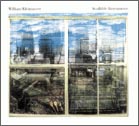 :: Composer William Kleinsasser (New Music Ensemble, founder) opens this vibrant disc with title track “Available Instruments (1998),” a duet for piano and computer utilizing the labels’ signature Cycling ’74 software programming. The piece was composed for Furman University pianist and teacher Daniel Koppelman. Kleinsasser’s Macintosh micro-editing processes the live piano with Max/MSP which enables manipulation of time and other tonal characteristics in the live performance. What results is a true collaboration of musicians working together to find parallels within the context of their playing with either music or technology – and balances the two with delicacy and precision. “Double Concerto (1996, 1998)” makes up for the remainder of this recording just shy of 1/2 hour long. This piece includes a full orchestra of 21 players conducted by Paul Rardin, director of the Vocal Jazz Ensemble of Towson University Center for the Arts. “Double Concerto” includes soloists Christian Colberg (viola, Baltimore Symphony Orchestra) and David Shumway (cello, Washington Concert Opera, Baltimore Opera) who aptly dramatize the composition with uncharacteristic string work. Kleinsasser uses his system to recycle portions of the music nearly in live-time, collaging his computer-based manipulation into the live piece. The design of the piece spectacularly contrasts to two soloists’ stylings. The software creates a varied synthesis of filters and gradations that are at once static-filled and flowing. It’s slightly difficult to tell “which is live and which is Memorex (er Macintosh)” while listening to the disc – maybe that’s a good thing? Some passages are obviously controlled; others have a more open, unrealized feel of improvisation giving the piece breath and symmetry. At about half-way through the track the battling strings travel and the horns warn. The piece becomes darker, more spatial and cinematic, winding to a crescendo with a fluidly placed electronic drone and lull. Former Oregonian, Kleinsasser, now teaching in Maryland, has made Available Instruments with moody air, romantic and paced, shadowy and immediate.
:: Composer William Kleinsasser (New Music Ensemble, founder) opens this vibrant disc with title track “Available Instruments (1998),” a duet for piano and computer utilizing the labels’ signature Cycling ’74 software programming. The piece was composed for Furman University pianist and teacher Daniel Koppelman. Kleinsasser’s Macintosh micro-editing processes the live piano with Max/MSP which enables manipulation of time and other tonal characteristics in the live performance. What results is a true collaboration of musicians working together to find parallels within the context of their playing with either music or technology – and balances the two with delicacy and precision. “Double Concerto (1996, 1998)” makes up for the remainder of this recording just shy of 1/2 hour long. This piece includes a full orchestra of 21 players conducted by Paul Rardin, director of the Vocal Jazz Ensemble of Towson University Center for the Arts. “Double Concerto” includes soloists Christian Colberg (viola, Baltimore Symphony Orchestra) and David Shumway (cello, Washington Concert Opera, Baltimore Opera) who aptly dramatize the composition with uncharacteristic string work. Kleinsasser uses his system to recycle portions of the music nearly in live-time, collaging his computer-based manipulation into the live piece. The design of the piece spectacularly contrasts to two soloists’ stylings. The software creates a varied synthesis of filters and gradations that are at once static-filled and flowing. It’s slightly difficult to tell “which is live and which is Memorex (er Macintosh)” while listening to the disc – maybe that’s a good thing? Some passages are obviously controlled; others have a more open, unrealized feel of improvisation giving the piece breath and symmetry. At about half-way through the track the battling strings travel and the horns warn. The piece becomes darker, more spatial and cinematic, winding to a crescendo with a fluidly placed electronic drone and lull. Former Oregonian, Kleinsasser, now teaching in Maryland, has made Available Instruments with moody air, romantic and paced, shadowy and immediate.
::..:::…..:..::….:::::..:::..:::::::……:::…::.:::….::::..:..:::…::…….::::
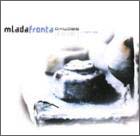 :: The immediacy and woopsy-daisy flip-flop groove of Oxydes has a charming appeal straight away. French Parametric label is a new scene player and is armed to bring us distorted sonicism with groove sensibility. If I had to make comparisons this is like a cross between early Autechre and Vladislav Delay with a tiny bit of Merzbow for good measure, but all references are fleeting in this original. This is the sixth official release from Mlada Fronta (Rémy Pelleschi) who since 1992 has been creating harsh dancefloor remedies. There is the bass of monster movies, the click-static of all good Mego records and building patterns with lot soft bells and whistles on “MnO.” All tracks make chemical compound references – and the tongue-in-cheek concept of these being remixed on disc two of this set make for a curious secret formula. This is post-drum+bass with as much angst as the old brand only a bit cleaner, while taking into account other contemporary trends in electronica. “TiO” fills the screen with synthesized, spidery gyrations. Some percussion is rubbery, some tinney, together dispersing anthemic fever into washes of late night empty schoolyards and sinister plumbers as in the standout track “RhO” – with sampled voice dialogue and a mystery plot. This eleven minute nugget keeps the ongoing rhythmic themes alive while at the same time dividing the listener’s attention into the drama of the unknown. It’s like a play within the grooves. Oxydes, which also includes previously unreleased video tracks in Quicktime format, is part two of a trilogy of CDx2 releases: Fe2O3 (M-tronic), Oxydes (Parametric) and Dioxydes (Parametric) to be released in 2003.
:: The immediacy and woopsy-daisy flip-flop groove of Oxydes has a charming appeal straight away. French Parametric label is a new scene player and is armed to bring us distorted sonicism with groove sensibility. If I had to make comparisons this is like a cross between early Autechre and Vladislav Delay with a tiny bit of Merzbow for good measure, but all references are fleeting in this original. This is the sixth official release from Mlada Fronta (Rémy Pelleschi) who since 1992 has been creating harsh dancefloor remedies. There is the bass of monster movies, the click-static of all good Mego records and building patterns with lot soft bells and whistles on “MnO.” All tracks make chemical compound references – and the tongue-in-cheek concept of these being remixed on disc two of this set make for a curious secret formula. This is post-drum+bass with as much angst as the old brand only a bit cleaner, while taking into account other contemporary trends in electronica. “TiO” fills the screen with synthesized, spidery gyrations. Some percussion is rubbery, some tinney, together dispersing anthemic fever into washes of late night empty schoolyards and sinister plumbers as in the standout track “RhO” – with sampled voice dialogue and a mystery plot. This eleven minute nugget keeps the ongoing rhythmic themes alive while at the same time dividing the listener’s attention into the drama of the unknown. It’s like a play within the grooves. Oxydes, which also includes previously unreleased video tracks in Quicktime format, is part two of a trilogy of CDx2 releases: Fe2O3 (M-tronic), Oxydes (Parametric) and Dioxydes (Parametric) to be released in 2003.
::..:::…..:..::….:::::..:::..:::::::……:::…::.:::….::::..:..:::…::…….::::
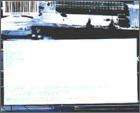 :: Radian is Martin Brandlmayr (Drums, Vibraphone, Computer), Stefan Németh (Synthesizers, Computer) and John Norman (Bass). The Viennese trio has been playing together for about a half-dozen years at such diverse locales as Tonic (NY) to Ars Electronica Festival (Austria) to All Tomorrow’s Parties (UK). “Jet” has the type of feedback that Jimi Hendrix’s mother cursed over. The overall sensibility here has impact and full stereo sound, every channel is filled, or at least tampered with. Full-on drone subtly paints the edges of the bassline and vibes making their way from the distance in “Kilvo.” Here we see the labelmate comparison to Tortoise (with whom they have played live), just toned down and tossled a tad. Radian has formerly recorded for the well respected Mego empire, playing alongside Pita in their very first year live and being captured by Rhiz Records at the time. The chattering “Bioadapter” makes its way into the microsound scene though makes room for some aberrant bass and signal play. Where 100s of records have accosted our senses with feedback wrath and fury – this time it seems sensible when balanced with faint, almost kodo-like drumming. Experimentation is in high gear for these three young men who blur genre lines seamlessly and with intention. “=Elot” evidences the bands mono recording techniques as it begs release from its Dadaist fly attitude towards traditional music making. Released in August (2002), Rec.Extern is superbly mixed by John McEntire (Stereolab, Trans Am) dubbing this a nearly perfect recording on all four wheels! The only imperfection here is the short 40 minute discount, made up for in sense of purpose, it begs a companion disk (or maybe that should be a diskette – nudge!).
:: Radian is Martin Brandlmayr (Drums, Vibraphone, Computer), Stefan Németh (Synthesizers, Computer) and John Norman (Bass). The Viennese trio has been playing together for about a half-dozen years at such diverse locales as Tonic (NY) to Ars Electronica Festival (Austria) to All Tomorrow’s Parties (UK). “Jet” has the type of feedback that Jimi Hendrix’s mother cursed over. The overall sensibility here has impact and full stereo sound, every channel is filled, or at least tampered with. Full-on drone subtly paints the edges of the bassline and vibes making their way from the distance in “Kilvo.” Here we see the labelmate comparison to Tortoise (with whom they have played live), just toned down and tossled a tad. Radian has formerly recorded for the well respected Mego empire, playing alongside Pita in their very first year live and being captured by Rhiz Records at the time. The chattering “Bioadapter” makes its way into the microsound scene though makes room for some aberrant bass and signal play. Where 100s of records have accosted our senses with feedback wrath and fury – this time it seems sensible when balanced with faint, almost kodo-like drumming. Experimentation is in high gear for these three young men who blur genre lines seamlessly and with intention. “=Elot” evidences the bands mono recording techniques as it begs release from its Dadaist fly attitude towards traditional music making. Released in August (2002), Rec.Extern is superbly mixed by John McEntire (Stereolab, Trans Am) dubbing this a nearly perfect recording on all four wheels! The only imperfection here is the short 40 minute discount, made up for in sense of purpose, it begs a companion disk (or maybe that should be a diskette – nudge!).
::..:::…..:..::….:::::..:::..:::::::……:::…::.:::….::::..:..:::…::…….::::
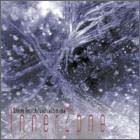 :: InnerZone is a rare record. Original, crisp and haunted, when you think about splinter genres like dark ambient, this is where monikers come from. Startling vast secrets of spirited culture woven into a dark, bellowing tapestry on “At The Edge Of Everything.” This is isolationist theory personified. On the soaring “Cloud Space” we are tenderized for the feast that becomes “Encounter Passage.” This track of gothic tribal murmur harkens me back to the recesses of the film “The Hunger.” InnerZone is filled with trance-like, beatless pacing created by vidnaObmana’s East-European flute, the fujara. Roach and Obmana make for a likely combination, collaborating on several projects over the years, piecing together an icy, cavernous work drawing the listener in and out of the foreground as heard on the track “Spires.” This is a soundtrack for permeated thought. A work of electronic sensitivity bathed in the gentle chiming of percussive tonalities heard in the extended 25 minute closing title track “InnerZone.” Having performed together live, Roach and Obmana have forged a known artistic language that awards itself from collaboration. Projekt has certainly outdone themselves with a near perfect recording defying much further description.
:: InnerZone is a rare record. Original, crisp and haunted, when you think about splinter genres like dark ambient, this is where monikers come from. Startling vast secrets of spirited culture woven into a dark, bellowing tapestry on “At The Edge Of Everything.” This is isolationist theory personified. On the soaring “Cloud Space” we are tenderized for the feast that becomes “Encounter Passage.” This track of gothic tribal murmur harkens me back to the recesses of the film “The Hunger.” InnerZone is filled with trance-like, beatless pacing created by vidnaObmana’s East-European flute, the fujara. Roach and Obmana make for a likely combination, collaborating on several projects over the years, piecing together an icy, cavernous work drawing the listener in and out of the foreground as heard on the track “Spires.” This is a soundtrack for permeated thought. A work of electronic sensitivity bathed in the gentle chiming of percussive tonalities heard in the extended 25 minute closing title track “InnerZone.” Having performed together live, Roach and Obmana have forged a known artistic language that awards itself from collaboration. Projekt has certainly outdone themselves with a near perfect recording defying much further description.
::..:::…..:..::….:::::..:::..:::::::……:::…::.:::….::::..:..:::…::…….::::
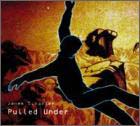 :: Masterful sound constructionist, Janek Schaefer, wastes no time in drawing profound, neo-ambient conclusions in his latest effort. “SuperChannel” is like a chamber orchestra strung upside down in a distant cave. The pecking, sudden flare and retraction of this army of tiny pests warns and persists as metals are sharpened and logic wavers. Drifting electrics wash in and out and right into “Rapid Xativa” which sounds like a darker interpretation of something Angelo Badalamenti may have composed for David Lynch while under the influence. The track bounces and blares in its idiosyncratic form. Schaefer, who trained as an architect at the Royal College of Art, also runs the audiOh! label which has released this, his first solo CD since Above Buildings (FatCat, 2000). Though he has released CDR’s and compilation tracks, and has offered work as part of installation projects and other soundtracks, this is by far his stand out recording to date. The ill warbling strings and contained menace on “Maison à Bordeaux” effectively use both fore and background. Having performed alongside such diverse musical forces as St. Etienne, Burnt Friedman, Goldfrapp, Bernhard Günter and Squarepusher, Schaefer seems to be working around the clock. “sienna,” has the staid ambience of a locked courtroom or ancient library. It’s infested with an erratic noise hive. The disc also includes the album mix of “Lithospheric Shifts” (formerly released on Sub Rosa) with its recombinant textures. Building on crude harmonic principles, Pulled Under is a feast for the senses, a gritty experiment in disorientation.
:: Masterful sound constructionist, Janek Schaefer, wastes no time in drawing profound, neo-ambient conclusions in his latest effort. “SuperChannel” is like a chamber orchestra strung upside down in a distant cave. The pecking, sudden flare and retraction of this army of tiny pests warns and persists as metals are sharpened and logic wavers. Drifting electrics wash in and out and right into “Rapid Xativa” which sounds like a darker interpretation of something Angelo Badalamenti may have composed for David Lynch while under the influence. The track bounces and blares in its idiosyncratic form. Schaefer, who trained as an architect at the Royal College of Art, also runs the audiOh! label which has released this, his first solo CD since Above Buildings (FatCat, 2000). Though he has released CDR’s and compilation tracks, and has offered work as part of installation projects and other soundtracks, this is by far his stand out recording to date. The ill warbling strings and contained menace on “Maison à Bordeaux” effectively use both fore and background. Having performed alongside such diverse musical forces as St. Etienne, Burnt Friedman, Goldfrapp, Bernhard Günter and Squarepusher, Schaefer seems to be working around the clock. “sienna,” has the staid ambience of a locked courtroom or ancient library. It’s infested with an erratic noise hive. The disc also includes the album mix of “Lithospheric Shifts” (formerly released on Sub Rosa) with its recombinant textures. Building on crude harmonic principles, Pulled Under is a feast for the senses, a gritty experiment in disorientation.
::..:::…..:..::….:::::..:::..:::::::……:::…::.:::….::::..:..:::…::…….::::
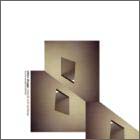 :: Objects and Buildings sets out to the “Pacific” in a track that murmers and crackles like an upturned Pole with a side of attitude. This is Skugge’s debut disc, and it’s right in line with other micro-releases from Mitek, Mille Plateaux and even Profan. In fact, Thomas Brinkmann comes to mind with multiple listens. In its resonant bass center intricate noise dimensions swirl and travel. This is deep sound with a perky beat. Digitones and funk programming make “4am” seem something worth waking up for. Its contact mic play and complex repetitive glitch creates dances with wires. It is as though you left the room after the record ended and the tone arm stayed in the lockgroove, taking on a merry little life of its own. Stockholm’s Skugge is a computer sciences student by day (no surprise there) who uses aged computers and freeware to shape broken-ass noise into shoulder rotating electronica. What we hear on Objects and Buildings is a stripping down of the facacde, and a rebuilding of simple structures on top of others in an assemblage of interconnected complexity. The end result is at once refined and stark without cold detachment as in “Eeg” and “Rev.” Closing the CD is “Module” slowing things down a bit, reckoning with itself as it fades away. This is a hit record on mars – superior summer listening to chillout and unravel the din of the city.
:: Objects and Buildings sets out to the “Pacific” in a track that murmers and crackles like an upturned Pole with a side of attitude. This is Skugge’s debut disc, and it’s right in line with other micro-releases from Mitek, Mille Plateaux and even Profan. In fact, Thomas Brinkmann comes to mind with multiple listens. In its resonant bass center intricate noise dimensions swirl and travel. This is deep sound with a perky beat. Digitones and funk programming make “4am” seem something worth waking up for. Its contact mic play and complex repetitive glitch creates dances with wires. It is as though you left the room after the record ended and the tone arm stayed in the lockgroove, taking on a merry little life of its own. Stockholm’s Skugge is a computer sciences student by day (no surprise there) who uses aged computers and freeware to shape broken-ass noise into shoulder rotating electronica. What we hear on Objects and Buildings is a stripping down of the facacde, and a rebuilding of simple structures on top of others in an assemblage of interconnected complexity. The end result is at once refined and stark without cold detachment as in “Eeg” and “Rev.” Closing the CD is “Module” slowing things down a bit, reckoning with itself as it fades away. This is a hit record on mars – superior summer listening to chillout and unravel the din of the city.
::..:::…..:..::….:::::..:::..:::::::……:::…::.:::….::::..:..:::…::…….::::
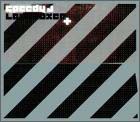 :: Speedy J (Jochem Paap) releases his third recording for Novamute, the follow-up to 2000’s A Shocking Hobby. On Loudboxer Paap fans the flames of a revitalized neo-techno. It’s abstract, edgy, hard and alive with enough bpms to kickstart this morning’s latte all over again! The disc-opener, “Reenter” is an apt title, giving vision to those unfamiliar with this artist’s tug-on-the-mainstream-cheek catalogue. The inspired mix is a cryptic wash of beat-driven delight. The sixteen tracks here are interwoven into an hour-long continuous groove. “Freq” plays with buzzing wires and remixes subtle feedback squarely into “(bihum)” which brings the offbeat rhythm further with anxious percussive friction. “Inter Zil,” a mini discourse fragment helps to distinguish the shape-shifter, “Krekc.” In its vibrance this first single pays a certain allegiance to all the finer points surviving from an era of by-gone power electronics. The hint here is that this Rotterdam-based producer has up’d the ante by making a record that could easily disguise itself to make an appearance on the flashier dancefloors this summer. The standout piece here is “Sevntrak” – out of logical schematic control while showing off this fine practitioner’s mighty appeal to interact with the physical listener. Unsettling, uptempo cross-sections of scattered sound shards grow bigger from here as the ongoing “Bugmod” through “Stroker” create a pulsating anthem, deconstructing the unfulfilled basics of drum + bass. Snares, filters, formulas, oh my! Closing the set is “Pannik (RMX)” taking a few dramatic minutes to warm up as it breakbeats into a heavy assembly of robotic bump and grind. This is a must-have disc for all those with dusty Warp(ed) vinyl, and should appeal to the micro-glitch set as well.
:: Speedy J (Jochem Paap) releases his third recording for Novamute, the follow-up to 2000’s A Shocking Hobby. On Loudboxer Paap fans the flames of a revitalized neo-techno. It’s abstract, edgy, hard and alive with enough bpms to kickstart this morning’s latte all over again! The disc-opener, “Reenter” is an apt title, giving vision to those unfamiliar with this artist’s tug-on-the-mainstream-cheek catalogue. The inspired mix is a cryptic wash of beat-driven delight. The sixteen tracks here are interwoven into an hour-long continuous groove. “Freq” plays with buzzing wires and remixes subtle feedback squarely into “(bihum)” which brings the offbeat rhythm further with anxious percussive friction. “Inter Zil,” a mini discourse fragment helps to distinguish the shape-shifter, “Krekc.” In its vibrance this first single pays a certain allegiance to all the finer points surviving from an era of by-gone power electronics. The hint here is that this Rotterdam-based producer has up’d the ante by making a record that could easily disguise itself to make an appearance on the flashier dancefloors this summer. The standout piece here is “Sevntrak” – out of logical schematic control while showing off this fine practitioner’s mighty appeal to interact with the physical listener. Unsettling, uptempo cross-sections of scattered sound shards grow bigger from here as the ongoing “Bugmod” through “Stroker” create a pulsating anthem, deconstructing the unfulfilled basics of drum + bass. Snares, filters, formulas, oh my! Closing the set is “Pannik (RMX)” taking a few dramatic minutes to warm up as it breakbeats into a heavy assembly of robotic bump and grind. This is a must-have disc for all those with dusty Warp(ed) vinyl, and should appeal to the micro-glitch set as well.
::..:::…..:..::….:::::..:::..:::::::……:::…::.:::….::::..:..:::…::…….::::
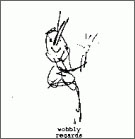 :: Funky from first track “Fake Cueing,” Wobbly (Jon Leidecker) brings us a cut-up rap-on-electro assemblage of sonic resilience flowing right through “Hard, Like Duck” (track 3). Moments of jiggly beat and circus frenzy give Regards its wacky sense of charm. Tapdancing typewriters and pipe organs meet cartoon featurettes playfully mocking each other in the two minute “Gled Ledley”. This is an all out People Like Us meets giggly Japanese teens vs. Bugs Bunny on a partially awakened acid trip. Leidecker shows that he can roll his sleeves in any direction and pride himself on the wrinkles created by such a gesture. This 3″ masterpiece clocks in under 20 minutes leaving me begging for more –and that would be in the form of the more recently released “companion” disc, Playlist (Illegal Art). The CD comes to a close with a layered static, handclap-fest meets Satie in an arm-wrestle. We are not worthy!
:: Funky from first track “Fake Cueing,” Wobbly (Jon Leidecker) brings us a cut-up rap-on-electro assemblage of sonic resilience flowing right through “Hard, Like Duck” (track 3). Moments of jiggly beat and circus frenzy give Regards its wacky sense of charm. Tapdancing typewriters and pipe organs meet cartoon featurettes playfully mocking each other in the two minute “Gled Ledley”. This is an all out People Like Us meets giggly Japanese teens vs. Bugs Bunny on a partially awakened acid trip. Leidecker shows that he can roll his sleeves in any direction and pride himself on the wrinkles created by such a gesture. This 3″ masterpiece clocks in under 20 minutes leaving me begging for more –and that would be in the form of the more recently released “companion” disc, Playlist (Illegal Art). The CD comes to a close with a layered static, handclap-fest meets Satie in an arm-wrestle. We are not worthy!
::..:::…..:..::….:::::..:::..:::::::……:::…::.:::….::::..:..:::…::…….::::
Essential Links ::
::..:::…..:..::….:::::..:::..:::::::……:::…::.:::….::::..:..:::…::…….::::
Note :: All reviews previously appeared in Instrumental Weekly.






